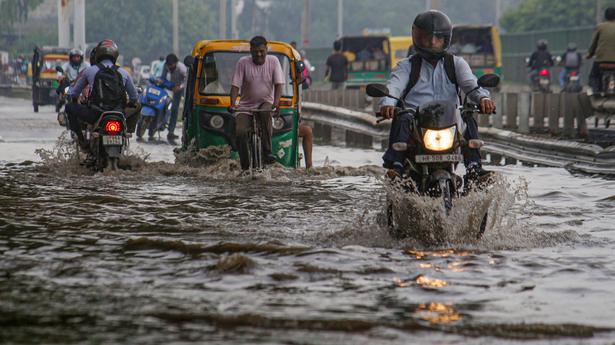
IMD predicts Monsoon to be normal in August, September
The Hindu
The expectations of a normal August and September are premised on the persistence of a La Nina, said IMD
Monsoon during August and September is expected to be ‘normal’ over most of India except for parts of eastern India, the India Meteorological Department (IMD) said on Monday.
“Normal to above normal rainfall is very likely over most parts of south India except west coast, west-central India and northwest India. The below-normal rainfall is likely over many parts of the west coast and some parts of eastcentral, east and northeast India,” officials said a press conference.
Monsoon rainfall in July, the rainiest monsoon month and crucial for agriculture, was surplus by 16% with most regions of the country getting surplus rainfall except for east and northeast India, which saw reported a 44% deficit. Overall, however, total rainfall during the monsoon (Jun-Aug 1) so far has been 7% surplus.
Monthly rainfall for August, the second-rainiest month during the monsoon, is most likely to be normal (94 to 106 % of its Long Period Average (LPA)). Most parts of southeast India, northwest India and adjoining west-central India are likely to get normal rains with below normal rains likely over west coast and many parts of east-central, east and northeast India.
Temperatures too are expected to be elevated over parts of the east-central, east and northeast India and some parts of northwest and south interior peninsular India, said an accompanying press statement by the IMD.
The expectations of a normal August and September are premised on the persistence of a La Nina, the converse of the El Nino and characterised by a cooling of the waters of the Central Pacific. The ensuing effects are expected to help bring more rain to the Indian subcontinent, unlike the El Nino which normally dries up the rain.
However, the Indian Ocean Dipole, another index of significance, marked by a swing of warm waters between the eastern and western halves of the Indian Ocean, to the monsoon is expected to be negative. A negative outlook is expected to be unfavourable for the monsoon though M Mohapatra, Director General, IMD, said that this wasn’t expected to translate into a serious deficit due to the favourable effect of the La Nina.

“Writing, in general, is a very solitary process,” says Yauvanika Chopra, Associate Director at The New India Foundation (NIF), which, earlier this year, announced the 12th edition of its NIF Book Fellowships for research and scholarship about Indian history after Independence. While authors, in general, are built for it, it can still get very lonely, says Chopra, pointing out that the fellowship’s community support is as valuable as the monetary benefits it offers. “There is a solid community of NIF fellows, trustees, language experts, jury members, all of whom are incredibly competent,” she says. “They really help make authors feel supported from manuscript to publication, so you never feel like you’re struggling through isolation.”

Several principals of government and private schools in Delhi on Tuesday said the Directorate of Education (DoE) circular from a day earlier, directing schools to conduct classes in ‘hybrid’ mode, had caused confusion regarding day-to-day operations as they did not know how many students would return to school from Wednesday and how would teachers instruct in two modes — online and in person — at once. The DoE circular on Monday had also stated that the option to “exercise online mode of education, wherever available, shall vest with the students and their guardians”. Several schoolteachers also expressed confusion regarding the DoE order. A government schoolteacher said he was unsure of how to cope with the resumption of physical classes, given that the order directing government offices to ensure that 50% of the employees work from home is still in place. On Monday, the Commission for Air Quality Management in the National Capital Region and Adjoining Areas (CAQM) had, on the orders of the Supreme Court, directed schools in Delhi-NCR to shift classes to the hybrid mode, following which the DoE had issued the circular. The court had urged the Centre’s pollution watchdog to consider restarting physical classes due to many students missing out on the mid-day meals and lacking the necessary means to attend classes online. The CAQM had, on November 20, asked schools in Delhi-NCR to shift to the online mode of teaching.









